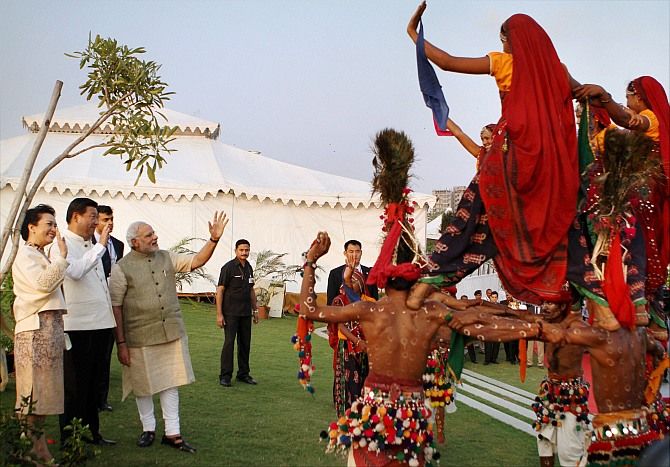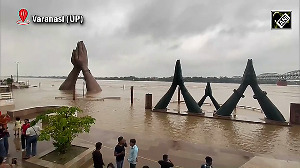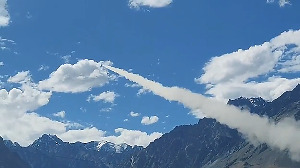 Image: Peng Liyuan, her husband Xi Jinping, general secretary of the Chinese Communist Party and president of China, Prime Minister Narendra Modi at a cultural performance on the Sabarmati River front, September 17, 2014. Credit: PTI Photo
Image: Peng Liyuan, her husband Xi Jinping, general secretary of the Chinese Communist Party and president of China, Prime Minister Narendra Modi at a cultural performance on the Sabarmati River front, September 17, 2014. Credit: PTI Photo'It's ironic that Modi visited Tokyo and talked about China's expansionism. The key will be to get beyond such unnecessary controversies and start afresh,' political scientist Marshall M Bouton tells Bikash Mohapatra/Rediff.com
Even as Chinese President Xi Jinping arrived in India on Wednesday, September 17, to bolster relations with India, there were reports about the Chinese People's Liberation Army's incursion into Ladakh.
"Specifically with China, India has very complicated equations to solve," says political scientist Marshall M Bouton. A Senior Fellow at the Centre for Advanced Study of India at the University of Pennsylvania, Dr Bouton trifurcated the issues India needs to address vis-a-vis its equation with China.
"On the economic front," he explained, "there is already both good news and bad -- good because Xi pledges more investments and bad because India is already facing a trade deficit," Dr Bouton, who won the India Abroad Friend of India Award 2012, pointed out. India Abroad, the oldest and best-known Indian-American weekly in the United States, is owned by Rediff.com
"The other question is if India should join the Trans-Pacific Partnership, if at all it is negotiated, or go with Beijing's version of a trade forum in Asia, the Regional Comprehensive Economic Partnership," he added.
"Besides, there is competition already, and more is bound to happen between India and China when it comes to resources, particularly pertaining to energy in the neighbouring areas as well as far off places like Africa and Latin America."
"On the political front," Dr Bouton, who is also president emeritus of the Chicago Council on Global Affairs, elaborated, "how far India and China go to engage each other diplomatically will be known during Modi's meeting with Xi Jinping."
"What will also matter is India's equation with multilateral organisations in Asia like ASEAN and how does it deal with borderline States like Myanmar," Dr Bouton said.
"On the security front, there is obviously the ongoing border dispute that India has to deal with in the north, and in the south you have a new challenge, which is China's increasing penetration of the Indian Ocean and its access arrangements in places like Sri Lanka and Pakistan."
"In fact, one of the biggest questions India faces is how to deal with an increasingly assertive China."
Dr Bouton believes the Indian leader should have been circumspect during his visit to Japan last fortnight, considering he was aware of the Chinese president's visit. "It is ironic that Modi visited Tokyo a few days ago and talked about China's expansionism," he explained.
"That was certainly not received well in Beijing," he said, adding, "The key now will be to get beyond such unnecessary controversies and start afresh."











